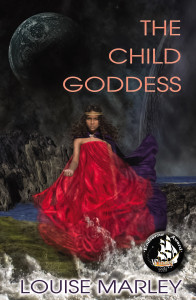 Louise Marley, a former concert and opera singer, is the award-winning author of eighteen novels of fantasy, science fiction, and historical fiction. She holds the world record for most concise author bio ever, probably because she was spending her time writing utterly remarkable things like the hair-raising The Terrorists of Irustan, or The Child Goddess
Louise Marley, a former concert and opera singer, is the award-winning author of eighteen novels of fantasy, science fiction, and historical fiction. She holds the world record for most concise author bio ever, probably because she was spending her time writing utterly remarkable things like the hair-raising The Terrorists of Irustan, or The Child Goddess, whose cover is pictured here. For more, see www.louisemarley.com.
I asked her, as I do: Is there a literary heroine on whom you imprinted as a child? A first love, a person you wanted to become as an adult, a heroic girl or woman you pretended to be on the playground at recess? Who was she?
The first heroine I identified with, at the age of about 8, was Jane, in Edward Eager’s enchanting novel Half Magic. Jane was like me, the oldest of a passel of kids, in a family with no father and a mother who was often away working. Jane, with her siblings, had to figure out why their wishes were coming half true, and how to get around that. Jane had to manage the younger ones in her family, and save them–and occasionally her mom–when the half-magic coin got them into trouble. I was fairly well convinced magic was real, and kept dreaming up ways it might be available to me.
Can you remember what it was she did or what qualities she had that captured your affections and your imagination so strongly?
Her courage and leadership were subtle, but appealing to a kid who also had to manage younger kids and try to juggle the practical with the imaginative. I loved the magic of it all, and wondered if I would have been able to solve the mystery of the magical coin myself.
How does she compare to the female characters in your work? Is she their literary ancestor? Do they rebel against all she stands for? What might your creations owe her?
I can’t say that Jane has inspired my female characters, I’m afraid, much as I loved her. My characters tend to be larger than life, heroic in the classical sense, and sometimes operatic. Of course, Jane was a kid–will always be a kid. In my as-yet-unpublished middle-grade sf novel, the protagonist is a girl who solves problems with science, and it could be that she has things in common with Jane, though she’s a bit older. The one thing Jane shares with my heroines would be the conviction that there is an answer, somewhere, just waiting to be found.
Bonus round: How do you feel about the word heroine? In these posts, I am specifically looking for female authors’ female influences, whether those women they looked up to were other writers or Anne of Green Gables. Does the word heroine have a purpose that isn’t served by equally well by hero?
I love the word heroine, and I love the other feminine forms of words–actress, authoress, murderess, and so forth. I hate the title “Ms.” and would much prefer to be called “Miss” as a generic honorific, the way opera singers are. Vive la difference, in my mind. I celebrate the feminine!
Bonus bonus: Once I discovered Superman, and then Supergirl, only the fact that I had reached a more advanced age–nine or so–stopped me from running around in a red cape. I thought Supergirl was the luckiest creature in the entire world. Talk about larger than life! I used to study those stories, and write in to the magazine if I thought there was an error.
About this post: The Heroine Question is my name for a series of short interviews with female writers about their favorite characters and literary influences. Clicking the link will allow you to browse all the other interviews, with awesome people like Leah Bobet, Alex Bledsoe, Marie Brennan, and Juliet McKenna. Or, if you prefer something more in the way of an actual index, it’s here.


